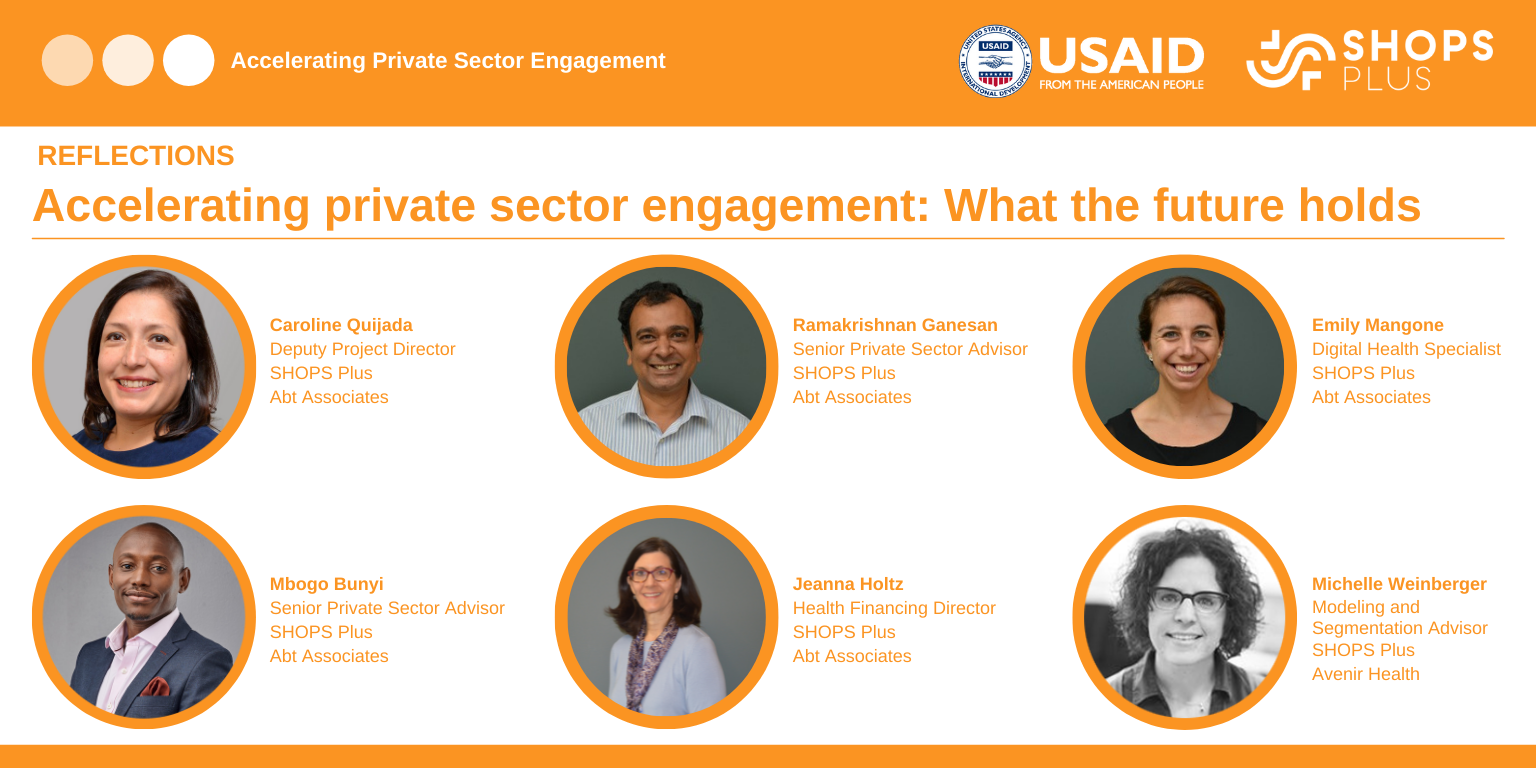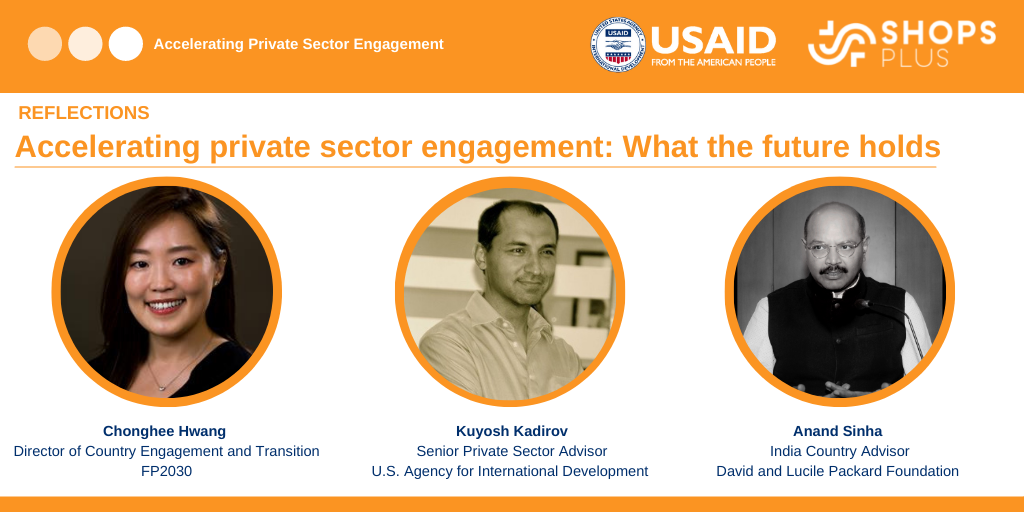Reflecting on progress, looking ahead—the fourth webinar
SHOPS Plus held the final webinar in its end-of-project series on July 14, 2021. Project leaders shared their perspectives from six years of engaging the private sector in health and explored what the future holds. Over 800 people registered and more than 230 participated live.
Susan Mitchell, SHOPS Plus project director, opened the event with an infographic and a slideshow that illustrated the project’s impact. From 2015 to 2020, the project reached 40 million people with health messages, generated 2.5 million couple years of protection, and facilitated the treatment of 2 million cases of childhood diarrhea with zinc and oral rehydration solution.
Caroline Quijada, SHOPS Plus deputy project director, moderated a panel of five SHOPS Plus leaders. Below are highlights from the discussion.

Reducing financial barriers to care
Jeanna Holtz, SHOPS Plus health financing director, noted the project’s success in facilitating the participation of private providers in government-sponsored health financing programs. This change will improve equity by reducing financial barriers to access care.
“I'm proud of SHOPS Plus contributions to enable private providers and government counterparts to partner through contracting arrangements that aim to be sustainable for both sides and to deliver affordable products and services in the private sector,” explained Holtz.
She noted that in Kenya, SHOPS Plus supported a local partner in facilitating agreements between private providers and Kenya’s National Hospital Insurance Fund. The support included digitizing and improving the business and clinical functions of small private practices, assisting them to become accredited with the NHIF, and helping them apply to participate in NHIF schemes. During this process, Holtz said they learned valuable lessons on how an intermediary can facilitate contracting at greater scale and efficiency with an expanding government-sponsored program. A publication on this activity is forthcoming. Sign up for the SHOPS Plus newsletter to be notified of new publications.
Partnering with companies for greater impact
Mbogo Bunyi, senior private sector advisor at Abt Associates, said, “Private sector engagement has helped get more in terms of health services, more scale, more accessibility, more sustainability, and more coverage.”
He discussed another activity in Kenya that SHOPS Plus led with a corporate partner, Twinings. The project facilitated a collaboration between a tea producer, Eastern Produce Kenya; the local community; and the public sector to upgrade a health facility that served farmers in the area to deliver more health services—including maternity and family planning services. This activity was designed to be replicable across tea sites in Kenya and beyond.
“[The Twinings partnership] was made possible because people came together. None of those individual partners could have done it on their own,” said Bunyi. Learn more about the corporate partnership with Twinings.
Cultivating social marketing in fragile states
Ramakrishnan Ganesan, senior private sector advisor at Abt Associates, affirmed the importance of private sector in fragile states.
“In an uncertain political or security context, people tend to turn to the private health sector because of its wide network,” he explained.
SHOPS Plus’s efforts in Afghanistan led to a growth of one million couple years of protection since 2016. A key factor to the success was using data to influence decisions, such as prioritizing geographies and identifying gaps in demand.
Learning what grows markets and why
Michelle Weinberger, modeling and segmentation advisor at Avenir Health, said her salient takeaway is that there is a growing appetite to use data to help tell us the “what” and collect new data that will help us learn the “why” so that we have the best information on how to grow health markets.
Weinberger reflected back to the first two years of SHOPS Plus when she and her colleagues analyzed and forecasted the role of the private sector as a source of contraception among young people across Family Planning 2020 countries. The analysis showed that marital status, more than age, affected patterns of private sector use among young people; unmarried young people went to the private sector at much higher rates than their married counterparts.
“This analysis brings up a host of different questions,” says Weinberger. “Why this is true? Is it about access differences? Is it about a preference for privacy? In reality, it’s probably a mix of all of these things and our data can tell us the ‘what,’ and not necessarily the ‘why.’ But we know that even just getting to that ‘what’ is an important step to building markets.” Learn more about the analysis in a brief.
Integrating user-centered digital approaches
Emily Mangone, SHOPS Plus senior digital health advisor, noted the project’s success integrating user-centered digital approaches and reaching 40 million people with health messages. She noted the development of TB STARR, a mobile application for use by various types of private providers; an artificial intelligence-powered chat bot in India; the use of WhatsApp; and mass text messages and several on-demand, interactive voice response systems.
“Over the past six years, we’ve really seen increased demand for supportive digital technology in the private sector, and we saw this demand surge during the pandemic for everything from clinical training to payment support to data collection. . . I’m excited to see the next generation of innovation at the intersection of private sector health and technology,” said Mangone.
Going forward, she stressed the importance of continuing to invest in local digital health innovators to have a more sustainable impact.

Predicting the future of private sector engagement
After speaking with SHOPS Plus leaders, Quijada moderated a discussion with Chonghee Hwang, Director, Country Engagement and Transition (Africa and Asia) of FP2030; Kuyosh Kadirov, Senior Private Sector Advisor of the U.S. Agency for International Development; and Anand Sinha, Country Advisor, India, of the David and Lucile Packard Foundation.
Hwang emphasized that looking beyond the public sector can significantly expand the reach and effectiveness of national family planning strategies and frameworks and that the private sector will continue to be a key partner in the FP2030 partnership. She noted that engaging the private sector in its commitment-making process with country governments, which is underway, has been a key area of interest for many country partners.
Kadirov said that, as family planning use continues to grow, we need to continue supporting the private sector and engaging them in family planning provision to improve equitable access, ensure availability, promote consumer choice, and strengthen the quality of care. USAID has many practical, proven, and impactful approaches for engaging the private sector in family planning that have helped the agency grow and strengthen family planning markets over the past several decades. He noted three approaches: social marketing, a total market approach, and social franchising. Kadirov hopes to see more efforts to help institutionalize these practices and other market development efforts with local implementing partners taking the lead.
Sinha predicted that there will be a stronger focus in the future on the strategic side of partnerships in which the private sector plays a role throughout the journey of the partnership, instead of only viewing the private sector as a source of funding.
He added, “I hope that the private sector will over the next couple of years become a little less shy about reproductive health and family planning. I think as we see more norm-changing work happening, the environment for engagement in family planning will improve.”
Watch the full recording.
The reflections webinar was the final webinar in a four-part series reflecting on global investments and field programs with USAID Missions. Highlighting achievements and lessons learned since 2015, private sector health experts covered broad thematic areas that affect access to health services through the private sector: stewardship, financing, and health markets. Learn more at www.shopsplusproject.org/EOPSeries.